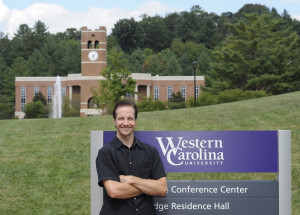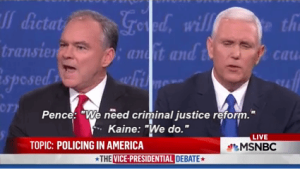This story was co-written with Haley Smith.
Stances on political issues have been the driving force for voters to decide on the best fit for president. A popular issue in the race has been racial tensions and the criminal justice system.
WCU criminal justice professor, Dr. Albert Kopak, spoke specifically about criminal justice, race and ethnicity in this election. Kopak mentioned a drastic difference between Hillary Clinton and Donald Trump’s campaigns in regards to these issues.

Dr. Albert Kopak of the WCU Criminal Justice Department
Photo courtesy of Western Carolina University
“It’s hard, if not impossible, to talk criminal justice policies without acknowledging how these are influenced by race and ethnicity, because our race and ethnic groups are the ones who are disproportionately impacted by contact with criminal justice,” said Kopak.
Trump is less specific than Clinton when it comes to his plans to address criminal justice issues, according to Kopak. None of Trump’s positions listed on his website include criminal justice.
Clinton is more specific in her plans to address criminal justice polices, Kopak added. Her website includes a focus on criminal justice reform and her plans of action to create a more efficient, less discriminatory system.
Race and ethnic issues have had a substantial impact on this election, with candidate’s opinions on controversial topics such as immigration varying greatly.
Americans’ fear of immigration is historically high, according to Business Insider. Kopak said America has a fear that immigrants are going to “take something away” from them.
Trump, in particular, has fed this fear by making many disparaging comments about immigrants, calling them “rapists” and “criminals.” Trump’s assertion that all immigrants are criminals has been questioned and mostly debunked.
Kopak pointed out the flaws in Trump’s argument.

Mike Pence and Tim Kaine agree of criminal justice reform in the Vice Presidential debate.
Photo Courtesy of U.S. Justice Action Network
“Immigrants, especially illegal ones, don’t want to come into contact with law enforcement,” said Kopak.
Kopak wrapped up his discussion by pointing out how Trump’s immigration policies may affect law enforcement.
“A lot of police would be discouraged by having to enforce anti-immigration policies,” said Kopak.
Kopak was one of the speakers on the last WCU’s ‘Intentional Conversations’, hosted by the Andrew Goodman Foundation and the Student Democracy Coalition , on Oct. 25. The event’s goal was to discuss issues that impact the election so that students can be informed heading into the polls.
With four professors on the panel, two student moderators and 20 students in attendance, other participants covered topics of local politics, gender and nativism, and how the media has handled election coverage were discussed.
“[The panelists] presented issues that are fundamentally important to this election, which was the purpose of the discussion,” said moderator and member of the Student Democracy Coalition, Emma Tate.
For students to get their voices heard on where they stand in these political issues, the best way is to vote. Early voting on WCU campus is in the UC Multipurpose room from Oct. 27 to Nov. 5. The Student Democracy Coalition set a goal of 75 percent voter turnout among students.


